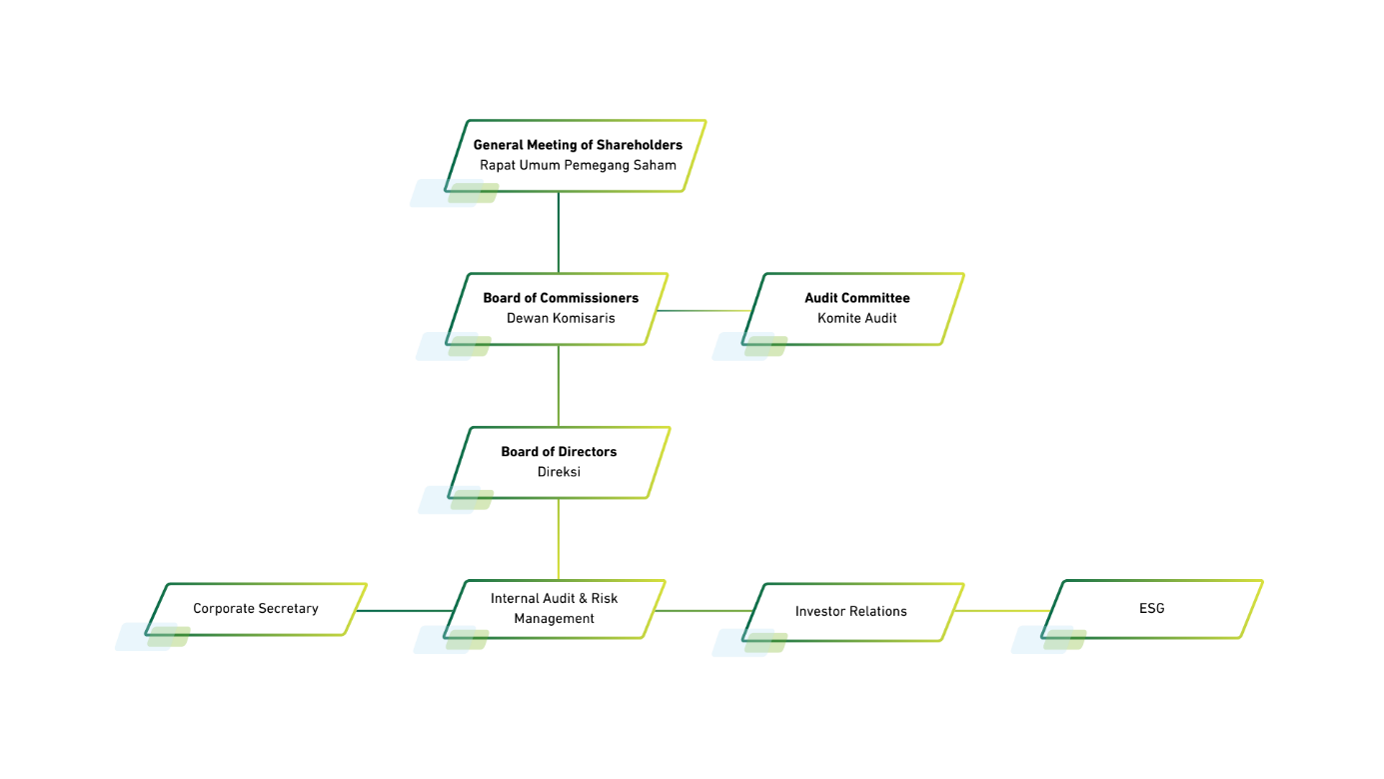Governance
Good Corporate Governance (GCG)
GCG principles
PT Adaro Andalan Indonesia Tbk ("Adaro") strives to keep enhancing the application of good corporate governance ("GCG") by integrating the aspects of environment, social and governance into its operational activities and business strategies. GCG application supports the company’s sustainability and vision to be
a leading Indonesian mining and energy group, which in turn will create sustainable value for the shareholders.
For consistent and continuous GCG application, Adaro has adopted the 4 (four) governance pillars of the Indonesian General Guideline for Corporate Governance (PUG-KI 2021), i.e. ethical conduct, accountability, transparency, and sustainability, which have been incorporated into its governance guidelines, such as Code of Conduct, the Board of Commissioners ("BoC") Charter, the Board of Directors ("BoD") Charter, Audit Committee Charter, Internal Audit Charter, and other policies.
Commitment to GCG implementation at all levels of Adaro
The commitment to implement the GCG principles is supported by all levels of Adaro, from the BoC, BoD, and the other levels below the boards.
By referring to the 4 (four) corporate governance pillars, i.e. ethical conduct, accountability, transparency, and sustainability, Adaro holds on to the commitment that:
- BoD and BoC carry out their roles and responsibilities independently to create sustainable value for the long-term best interest of the company and the shareholders, by taking into account the interest of the stakeholders.
The members of the BoD and BoC are selected and appointed in such a way that the BoD as the management organ and the BoC BoC as supervisory organ have diverse member compositions, and each of the boards consist of directors and commissioners who have the necessary commitment, knowledge, competence, experience, and expertise to properly fulfill the management roles of the BoD and the supervisory roles of the BoC.
- Remuneration is determined to effectively align the interest of the BoD and BoC members with the long-term interest of the company and sustainable value creation.
- BoD and BoC engage in a close, open, constructive, and professional work relationship and have mutual respect for the best interest of the company.
- Adaro takes actions in an ethical and responsible manner and enforces the organization’s values and culture.
- Adaro applies corporate governance practices integrated with the internal control and risk management, in addition to effective compliance management system to achieve the corporate goals, vision, missions, objectives, and targets in operating the business with integrity.
- Adaro makes accurate and timely disclosure on all material subjects on the corporation.
- Adaro protects and facilitates the exercise of shareholders’ rights and ensures fair treatments on all shareholders, including minority shareholders. All shareholders are entitled to the opportunity to obtain effective compensation on any violation to their rights.
- Adaro recognizes the stakeholders’ rights as stipulated in the applicable rules and regulations or an agreement made by the corporation and encourages active cooperation with the stakeholders to create assets, job opportunities, and financially healthy and sustainable business
Structure of Adaro’s Governance Organs
Pursuant to Law 40 of 2007 of the Republic of Indonesia concerning Limited-liability Companies as amended by the Government Regulation in lieu of Law no. 2 of 2022 on Job Creation as enacted into a law based on Law no. 6 of 2023 on the Enactment of Government Regulation in lieu of Law of the Republic of Indonesia No. 2 of 2022 concerning Job Creation into Law ("UUPT"), Adaro’s organs consist of General Meeting of Shareholders ("GMS"), BoD, and BoC. Each organ plays important roles in governance, and has their respective functions, duties and responsibilities for the best interest of Adaro in conducting business activities according to the Articles of Association and the applicable laws and regulations.
- GMS is a company organ that has authority not granted to the BoD or BoC, within the scope as determined by the applicable laws and/or Articles of Association.
- BoC is a company organ who is tasked with general and/or specific supervision based on the Articles of Association and provides advice to the BoD.
- BoD is a company organ who has full authority and responsibility to conduct Adaro’s management for Adaro’s interests in accordance with its objectives and purposes, and to represent Adaro, in or out of court of law, in accordance with the Articles of Association.
The following is the chart showing Adaro’s governance structure:



